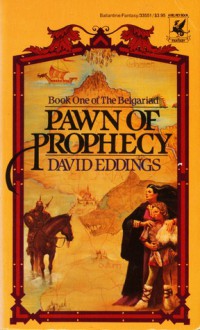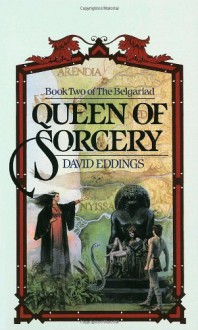
There is nothing I hate more than trying to review one of my all-time favorite books from my teenage years. We all know the reason: the book just never lives up to your memories of its perfection. A fact - which if we are honest with ourselves - is inevitable, because we personally have changed too much, the world has changed too much, and our tastes have changed too much since the initial reading. This is true to a certain extent with David Edding’s Pawn of Prophecy.
Back when I picked up this first novel of The Belgariad in 1984, I was a 13-year-old or a 14-year-old (I can’t remember which anymore) just getting over an addiction to Dungeon & Dragons and trying to transition away from my pre-teen persona into my young adult one. I had also just recently made the life altering discovery of J.R.R. Tolkien, whose books made me fall in love with fantasy and ruined my dreams of ever being considered a cool kid in high school. (It was hard to be cool when you were reading The Hobbit and making jokes about what exactly JRR was talking about when he wrote "...it was a hobbit-hole, and that means comfort", but I probably shouldn’t really mention that in this review.) So when Pawn of Prophecy found its way into my hands, it must have been fate, and I fell very hard for all things related to Belgarath, Polgara or Garion. A love which lasted into my early twenties and began from the very first page of this novel.
As a teen who adored the Council of Elrond chapter in The Fellowship of the Ring, the prologue to Pawn of Prophecy was like getting a fix of my favorite pharmaceutical product. Where else except for The Silmarillion could I get to read about ancient gods creating a world only to have its perfection marred by some horrible act and throw creation into a state of constant strife? Not too many places. So within minutes, I was addicted to this story of maimed Torak and his eternal conflict with his godly siblings over possession of the Orb of Aldur, and I had to have more. Honestly, it was just a great hook.
From this beginning, Mr. Eddings immediately thrust me into the story of a simple farm boy named Garion. I learned of his earliest memories, hiding under a table watching his Aunt Pol cook. I experienced him growing up with his childhood friends, playing games, and even saw his first romance between himself and a local girl Zubrette. I also read about - but payed little attention to - the introduction of a wandering storyteller named Mister Wolf, who seemed like the comic relief more than a major character. (Boy, was I wrong on that!) And like all good fantasy books, Mr. Eddings provided me with constant foreshadowing that there was some terrible evil lurking right around the corner, waiting to destroy all this normalcy. A feeling which he deftly stoked by scene after scene of Garion experiencing visions of an unknown antagonist stalking him.
Naturally, one day Garion’s quiet farm life did end and end suddenly. Mister Wolf arriving at the farm unexpectedly, bearing news that a mysterious object has been stolen by a thief whom no-one will name. This news shocks Aunt Pol, causing her to pack up her and Garion’s things and leave the farm with Mister Wolf, dragging our clueless teenager along against his will. From there the true adventures began, and what a tale it was!
A huge, colorful world inhabited by different cultures, grand characters, and even ancient gods opened up before Garion. All of it there for our young farm boy to see and experience and me tagging along behind. Mr. Eddings dazzled both of us with his constant unveiling of ancient mysteries, evil villains, grand conspiracies, divine prophecies, and wonderful history. And the whole time, I - a teenager myself - witnessed one more thing: Garion dealing with the normal teen angst of a simple boy ripped from his safe home and thrown into a larger, more dangerous world than he ever imagined. Every adventure, every heartbreak he experienced slowly turning him into a young man before my reading eyes. Something that I was also struggling with in my own life though in different ways.
It was a grand ride that Mr. Eddings took my teenage self on during those years, and I adored every one - even when I was 19 instead of a 13-year-old, because for a few hours I could go back "home" and visit my teen heroes Garion, Belgarath, Aunt Pol, Silk, and all the rest. They felt like family to me. And it all started with this book.
Later in life I returned to Pawn of Prophecy to revisit my old "friends." Like many times when you visit your childhood haunts, I found that things had changed - specifically me. I was older. No doubt about that. The mirror doesn’t lie after all. Plus, I was a father now. Responsibilities and all that other grown up stuff weighing me down. And I have to admit that I was now a bit jaded about life. Things were more gray and a lot less black and white than back in my teen years. So Pawn of Prophecy’s straightforward fantasy about good guys defeating bad guys did not energize me as much as it once did. The best comparison I can give is going to your twentieth high school reunion excited to see your old girlfriend/boyfriend only to realize they aren’t sixteen anymore, have put on thirty pounds and gotten wrinkles just like you. How dare they change! That is how I felt as I sat there reading about my old friends Garion, Belgarath, and Polgara.
So why the five (5) star rating if I felt this way on my re-read you ask?
Simple: I try to rate my favorite, childhood books by what I thought of them when I read them the first time.
Maybe rating certain novels that way is wrong, but I cannot think of another way to be fair to a novel which I dearly loved at an earlier period of my life. It isn’t the books fault that I have gotten older after all. And the truth of the matter is that when I read Pawn of Prophecy - not once but numerous times in the 80s - I absolutely loved it! The simple plot and world spanning journeys of Garion bedazzled me, making me want more and more, and in my obviously biased opinion, it is still a great book for the right person - maybe another 13-year-old boy trying to grow up. Because I truly believe that even in its simplicity Pawn of Prophecy can still speak to that person and begin them on their journey into the world of fantasy novels. For that reason - and all my personal memories of it - Pawn of Prophecy will always remain a 5 star book and one of my all-time favorite fantasy novels.
 Listening to a classic fantasy story that I head read multiple times was certainly an interesting experience. It took me some time to get used to the pronunciations used but narrator soon captured me in this world again and I might even have enjoyed this more than all the times I have read this one.
Listening to a classic fantasy story that I head read multiple times was certainly an interesting experience. It took me some time to get used to the pronunciations used but narrator soon captured me in this world again and I might even have enjoyed this more than all the times I have read this one.
 Log in with Facebook
Log in with Facebook 









